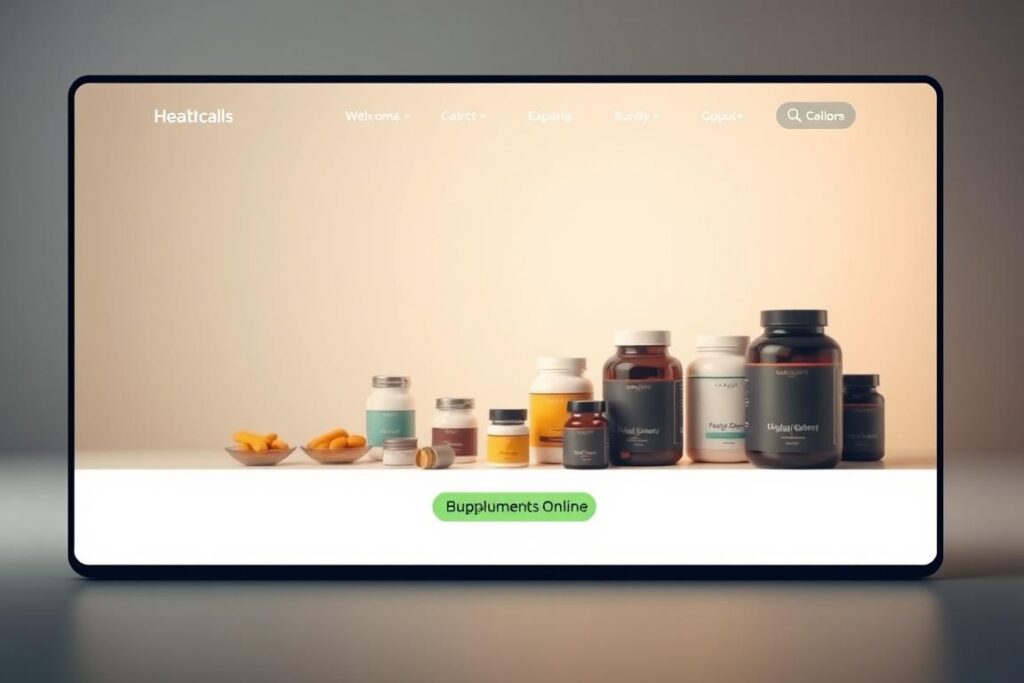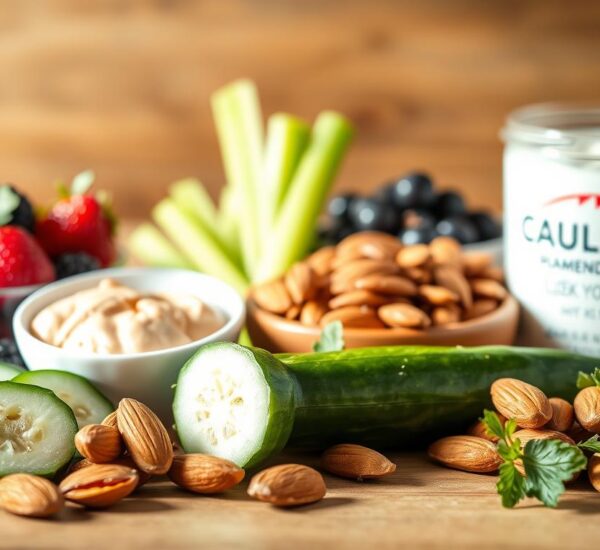Do you get all the nutrients your body needs from food alone? With our busy lives, it’s easy to miss out on some nutrients.
Dr. Amrendra Kumar says a balanced diet gives us energy, helps us grow, boosts our immune system, and fights off chronic diseases. Yet, even with a good diet, we might need more to stay healthy.
Adding dietary supplements to our daily routine can help us get closer to better health and wellbeing.
Key Takeaways
- A well-balanced diet is key for staying healthy.
- Nutritional gaps can be filled with supplements.
- Dietary supplements boost our immune system and health.
- Supplements can improve our overall wellbeing.
- Combining a healthy diet with supplements is essential for optimal health.
Understanding Nutritional Supplements
There are many nutritional supplements out there. It’s key to know their role in our health. Janice Hermann, a nutrition specialist at Oklahoma State University, says supplements are meant to add to our diet, not replace it. This is important as we explore the world of vitamin and health supplements.
What Are Nutritional Supplements?
Nutritional supplements help boost our diet by adding nutrients we might miss. They include vitamin supplements, mineral supplements, and herbal supplements. Knowing what they are helps us see how they can help our health.
Types of Nutritional Supplements
There are many kinds of nutritional supplements, each with its own benefits. Here are a few:
- Vitamin supplements: These give us essential vitamins our bodies need.
- Mineral supplements: They offer minerals important for our body’s functions.
- Herbal supplements: Made from plants, they support specific health needs.
| Supplement Type | Primary Benefit | Common Examples |
|---|---|---|
| Vitamin Supplements | Fill nutritional gaps | Multivitamins, Vitamin C |
| Mineral Supplements | Support bodily functions | Calcium, Iron |
| Herbal Supplements | Address specific health needs | Echinacea, Ginkgo Biloba |
By knowing the different supplements, we can choose the right ones for our health goals.
Benefits of Taking Nutritional Supplements
Nutritional supplements are a great tool for keeping us healthy in today’s world. Dr. Michael Yuan, a primary care physician at AdventHealth Medical Group Primary Care at Founders, helps us see their value. He shows how supplements can meet our health needs.
Dr. Yuan says some people need special vitamins because of health issues or lack of nutrients. For example, thiamine or vitamin D supplements are key for certain deficiencies. This shows how important it is to know what nutrients we need.
Supporting Immune Health
Nutritional supplements are great for boosting our immune system. By adding natural supplements to our daily routine, we can fight off diseases better.
A strong immune system is key to staying healthy. Some supplements, like vitamin C, are known to help our immune system.
| Supplement | Immune System Benefit | Recommended Daily Intake |
|---|---|---|
| Vitamin C | Boosts immune cell production | 60-90 mg |
| Zinc | Supports immune cell function | 8-11 mg |
| Probiotics | Enhances gut-associated immune function | 1-10 billion CFU |
Enhancing Physical Performance
Nutritional supplements are also great for improving physical performance. They are popular among athletes and those who stay active. The best supplements for athletes often help with muscle strength and recovery.
For example, protein supplements help grow and repair muscles. Creatine also boosts muscle strength and endurance.
Promoting Mental Wellbeing
Nutritional supplements can also help with mental health. Some supplements support mood and brain function. They are a good addition to traditional mental health care.
Omega-3 fatty acids, for instance, are good for brain health. They may also help with depression symptoms.
Understanding the benefits of nutritional supplements helps us make smart choices. They support our immune system, physical performance, and mental health. This knowledge helps us use them wisely in our health routine.
Who Should Consider Nutritional Supplements
Nutritional supplements help many people reach their health goals. They are great for those who need extra support. A balanced diet is key, but some may need more to stay healthy.
It’s important to know what you need. Athletes and active individuals often need more nutrients. This is because they burn more energy and need to repair muscles.
Athletes and Active Individuals
Athletes and those who are active a lot can benefit from certain supplements. Protein helps repair muscles, and creatine boosts performance. Electrolyte supplements also help with staying hydrated.
- Protein supplements for muscle repair
- Creatine for enhanced performance
- Electrolyte supplements for hydration
When buying supplements online, choose reputable sources. This ensures you get quality and safe products.
Seniors and Aging Adults
Seniors and aging adults can also benefit from supplements. They help with bone health, like calcium and vitamin D. Dr. Amrendra Kumar says folic acid is good for pregnant women or those trying to conceive.
Think about your health needs when picking supplements. Talk to a healthcare professional to find the best ones for you. You can buy supplements online from trusted vendors for high-quality products.

Common Ingredients in Nutritional Supplements
Understanding the common ingredients in nutritional supplements is key. They can have many benefits and interactions. Knowing what’s in them helps make informed choices.
Janice Hermann says healthy foods offer more than just one vitamin or mineral. They provide a wide range of nutrients. This makes it important to know what’s in supplements to complement a balanced diet.
Vitamins and Minerals
Vitamins and minerals are common in supplements. They help with energy and immune function. For example, Vitamin C boosts immune health, and Calcium is good for bones.
| Vitamin/Mineral | Primary Function | Food Sources |
|---|---|---|
| Vitamin C | Immune support, antioxidant | Citrus fruits, strawberries, bell peppers |
| Calcium | Bone health | Dairy products, leafy greens, fortified foods |
| Iron | Oxygen transport, energy production | Red meat, poultry, beans, fortified cereals |
Herbal Extracts
Herbal extracts are also common in supplements. They come from plants and offer health benefits. For example, Echinacea supports immune health, and Ginkgo biloba may improve brain function.
- Echinacea: May support immune health
- Ginkgo biloba: May improve cognitive function
- Turmeric/Curcumin: Anti-inflammatory properties
Amino Acids
Amino acids are vital for our bodies. They help build proteins and support health. Supplements with amino acids, like BCAAs, help athletes recover.
Knowing what’s in supplements helps us make better health choices. It’s important to think about their benefits and how they might interact with our health goals.
How to Choose the Right Nutritional Supplements
Choosing the right nutritional supplements means knowing what you need and what labels say. With so many options, it can feel overwhelming. But, by focusing on your health goals and talking to doctors, you can find what you need.
Assessing Your Nutritional Needs
First, figure out what you need. Think about your diet, lifestyle, and health. For example, vegans might need more vitamin B12, iron, or omega-3s. Talking to a doctor can help find what’s best for you.
To figure out what you need, follow these steps:
- Check your diet for any missing nutrients.
- Think about your health and any conditions you have.
- Consider your lifestyle, like how active you are and any stress.
For more on diet and supplements, check out ProsperGlow’s guide on dietary strategies for type 2 diabetes. Knowing how diet and supplements work together helps you choose better.
Reading Labels Effectively
After knowing what you need, it’s time to read labels. Look at the ingredients, check for third-party certifications, and watch for allergens or drug interactions. Make sure the label shows the right amount of the active ingredient for you.
Be careful of false claims and choose products from trusted makers. Look for NSF International or National Science Foundation certifications. They show the product is safe and of good quality.
By understanding your needs and reading labels well, you can pick the right supplements. This careful approach improves your health and makes sure you get the most from your supplements.
Potential Risks and Side Effects
Nutritional supplements can be helpful, but knowing the risks is key. Dr. Amrendra Kumar advises talking to a doctor before starting supplements. Natural supplements are great, but too much or wrong use can cause problems.
Overconsumption and Toxicity
Too much of supplements can be toxic, mainly for fat-soluble vitamins like A, D, E, and K. These vitamins can build up in the body.
Too much vitamin A can cause headaches, dizziness, and even liver damage. Too much iron can upset your stomach and harm organs.

| Nutrient | Potential Toxicity Level | Symptoms of Excess |
|---|---|---|
| Vitamin A | High | Headaches, dizziness, liver damage |
| Iron | High | Gastrointestinal issues, organ damage |
| Vitamin C | Low | Gastrointestinal upset |
Interactions with Medications
Supplements can also interact with medicines. For example, some can make blood thinners work too well, raising bleeding risks. Others might make some medicines less effective.
For more on safe supplement use, check out biotin myths and its effects on.
Knowing the risks and side effects helps us use supplements wisely. Always talk to a doctor before starting any supplement plan.
The Role of Nutrition in Overall Wellness
Nutrition is key to our overall wellness. It’s the base of our health. A healthy diet gives us the nutrients, vitamins, and minerals our bodies need. Janice Hermann says a healthy diet is vital, and supplements can support a healthy lifestyle.
To be well, we must build a balanced diet. This diet should include fruits, vegetables, whole grains, lean proteins, and healthy fats. This way, our bodies get the nutrients they need to stay healthy.
Nourishing Your Body
A balanced diet is essential for wellness. It boosts our immune system, gives us energy, and supports our physical and mental health. Eating right helps us handle daily life better.
Key parts of a balanced diet are:
- Fresh fruits and vegetables
- Whole grains, such as brown rice and quinoa
- Lean proteins, like chicken and fish
- Healthy fats, such as those found in nuts and avocados
When Supplements Are Not Necessary
Supplements are helpful but not always needed. If we eat well and live healthily, we might not need them. Supplements should not replace a healthy diet but enhance it when needed.
When thinking about supplements, look for them from a trusted online supplements shop or buy supplements online from reliable sources. This ensures you get quality products that meet your nutritional needs.
By focusing on nutrition and using supplements wisely, we can actively improve our health and wellbeing. Whether it’s boosting our immune system, improving physical performance, or supporting mental health, a balanced diet and smart supplement use can help us reach our wellness goals.
Debunking Myths About Nutritional Supplements
Understanding nutritional supplements is key. The industry offers many products, each claiming to improve health. But not all are the same, and myths can confuse us.
Dr. Michael Yuan says there’s a lot of wrong info about vitamins. Knowing the truth helps us make better health choices.
Misconceptions About Effectiveness
Many think supplements can replace a good diet. But they’re meant to add to it, not take its place. Whole foods give us all the nutrients we need for health.
- Misunderstanding the Role of Supplements: Some think supplements are a quick fix. But they’re meant to support a healthy lifestyle, not replace it.
- Overestimating the Benefits: Some ads make supplements seem too good to be true. Always check if the claims are backed by science.
The Myth of “Magic Pills”
The idea of a “magic pill” is a big myth. No single supplement can do it all. A balanced diet, exercise, and a healthy lifestyle are key.
Key Facts to Consider:
- Supplements should complement, not replace, a healthy diet and lifestyle.
- Not all supplements are backed by scientific evidence; it’s essential to look for products that have been tested for efficacy and safety.
- Consulting with a healthcare professional before starting any supplement regimen is critical to ensure safety and effectiveness.
Knowing the truth about supplements helps us make better choices. They should support, not replace, a healthy lifestyle.
As we explore supplements, staying informed is vital. True health comes from a balanced diet, exercise, and sometimes supplements.
Incorporating Nutritional Supplements Into Your Routine
Adding nutritional supplements to your daily routine can boost your health. Health experts like Dr. Amrendra Kumar say they’re great when used with a balanced diet.
To make supplements a part of your day, set a routine. Take them with healthy habits. This way, you get the most out of them and care for your health in a complete way.
Establishing a Supplement Schedule
Having a schedule for supplements ensures you take them right. Try to take them with meals to make it a habit.
- Find the best times for your supplements to be absorbed well.
- Keep a list of your supplements and how much to take.
- Change your schedule if your body needs it.
Being consistent is important for supplements to work well. Regular use helps reach your health goals.
Combining Supplements with Healthy Habits
Supplements are great, but they’re even better with a healthy lifestyle. Eat well, exercise, and sleep well too.
| Healthy Habit | Benefit | Supplement Synergy |
|---|---|---|
| Balanced Diet | Provides essential nutrients | Enhances supplement absorption |
| Regular Exercise | Improves physical health | Boosts the effectiveness of certain supplements |
| Good Sleep Hygiene | Supports mental and physical recovery | Helps regulate the body’s response to supplements |
By adding supplements to your daily routine and healthy habits, you can see big health improvements. It’s about a holistic approach to health that includes supplements and a healthy lifestyle.
Conclusion: Taking Charge of Your Health
Nutritional supplements can be key to keeping us healthy and feeling good. Knowing the good and bad about them helps us make smart choices for our health.
Professional Guidance for Supplement Use
Janice Hermann says supplements are great when used right. But remember, they’re meant to add to a healthy diet, not take its place. Getting advice from a doctor ensures we use them safely and effectively.
A Holistic Approach to Wellness
Supplements are just part of a bigger health plan. Adding them to a balanced diet, exercise, and healthy habits boosts our wellbeing. Whether you want to boost your immune system or improve your fitness, using natural supplements wisely can help you reach your goals.



